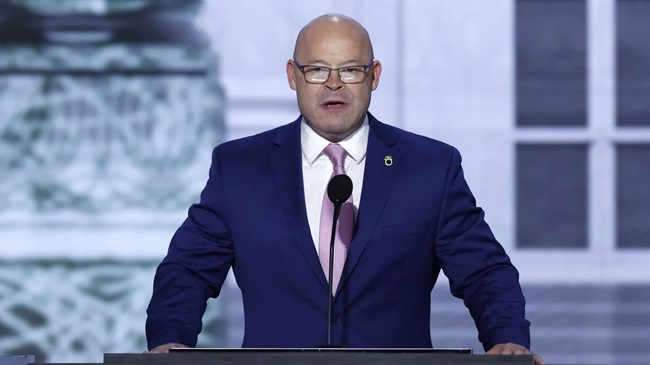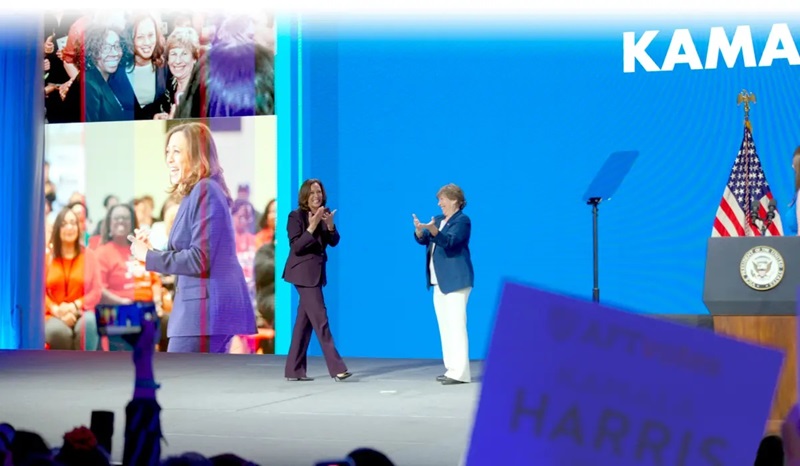Teachers’ unions lean in on national ticket shift and a state ballot push.

AFT Massachusetts President Jessica Tang
AFT Mass. president Jessica Tang talks Harris pivot, Teamsters drama, MCAS initiative
ALONG WITH MOST of the Democratic coalition, the American Federation of Teachers turned on a dime during a pivotal July weekend. Just as their biennial convention kicked off, the executive committee jumped from endorsing Joe Biden on a Saturday to flipping to Kamala Harris on Sunday after Biden dropped out.
The top of the ticket was a known quantity, even with the dramatic change-up capping off a month of pressure from party insiders and nervous onlookers. Biden and Harris “already had an extremely strong record that is extremely pro-labor, pro-worker, and pro-public education,” AFT Massachusetts president Jessica Tang said on The Codcast. Teachers unions thought they had a strong sense of what Harris would bring to the fore, noting her $168 million settlement against an online for-profit charter school when she was attorney general of California.
Educators in particular then focused on the so-called “veepstakes” as a signal on their policy priorities as much as the top of the ticket.
Pennsylvania Gov. Josh Shapiro’s stances on vouchers and “public education in general” concerned national teachers unions, Tang said. “To be fair, even the educator unions in Pennsylvania ultimately got behind him,” she said of Shapiro. “And we were going to get behind whoever Kamala Harris really felt was going to be her best partner, because the most important thing is also winning this November.”
They didn’t have to bite their tongues, ultimately, because the choice was former high school social studies teacher Tim Walz – the clear preferred pick of the education unions.
“Tim Walz was obviously a favorite for a lot of people, including myself, because he was an AFT member and an educator, and we knew that he would just understand what the experience is like to teach in America in 2024 and the challenges that we face,” Tang said. “And so I think it was just really, really exciting when he was actually chosen.”
Tang, who used to helm the Boston Teachers Union and is the first person of color to serve as president of AFT Massachusetts, spent the last week in Chicago as a delegate at the Democratic National Convention.

SEAN O’BRIEN
There was some union drama in the background of the convention. Sean O’Brien, a Medford native and president of the International Brotherhood of Teamsters, spoke at the Republican National Convention in July. Though he railed against the excesses and behavior of big business in the speech, O’Brien found himself iced out of a speaking slot at a Democratic convention that leaned into union solidarity.
CommonWealth Beacon · Teachers unions and the Democratic Party
Delegates and speakers at the DNC enthusiastically slammed Republicans as anti-worker, with several unions already running out ads and charging labor violations stemming from former President Donald Trump’s apparent praise for union-busting behavior in conversation with Elon Musk. Local politicians merrily chanted “Trump’s a scab” as United Auto Workers president Shawn Fain took to the stage in a red shirt with the message emblazoned on his chest.
But unity is the party line, and Tang was diplomatic in her assessment of O’Brien’s decision. Unions walk a delicate balance in national and local politics, as most reliable interest groups do – usually demonstrating solidarity with the team most likely to back their interests while agitating against their support being taken for granted.
“Even the Boston Teachers Union endorsed a Republican before,” Tang noted. “So it’s not like we won’t talk to anyone except for a specific party. That’s just not true. It’s about issues, it’s about values, it’s about alignment.”
Tang cited the Project 2025 plan put out by the conservative Heritage Foundation and touted as a guide to another Trump presidency. Of that plan and Trump’s remarks to Musk, she said, “you can’t be more anti-union than that, and so why would you even bother [to speak to the RNC]? But then, on the other side, there was also commentary that, well, at least there was a union voice there … Perhaps that was an opportunity to speak to an audience that otherwise may not hear that message.”
Tang’s eyes aren’t just focused on the national stage.
In Massachusetts, an intense ballot measure campaign is ramping up around an effort to eliminate the 10th grade MCAS test as a graduation requirement. The measure – Question 2 on the November ballot – would instead require students to complete coursework that meets state standards.
State education unions are in alignment on the measure, Tang said. Though the Massachusetts Teachers Association is championing the campaign, the AFT Massachusetts and the Boston Teachers Union are agitating for the change as well, arguing that the high stakes testing is unfairly denying diplomas to hundreds of students who have otherwise met district requirements and the MCAS metrics are a poor tool to determine whether a district is in need of additional state oversight or often interminable receivership.

The groups would have preferred that the Legislature consider the proposed Thrive Act, Tang said, “which is much more comprehensive than if the ballot question were passed. That would’ve been the better path forward, honestly.”
Like so many bills on Beacon Hill, the Thrive Act withered over the course of the term. Along with removing the MCAS graduation requirement and establishing a special commission to determine new standards for student achievement, it would have changed the ways that underperforming schools and districts are assessed. Championed by progressives in the House and Senate, it was ultimately sent to study and effectively killed at the beginning of July.
Helmed by business groups and nonprofits, opponents of Question 2 say keeping MCAS is necessary to preserve the value of a Massachusetts diploma and essential for assessing students and school performance consistently across the state.
The nature of ballot question phrasing is already causing some confusion and misinformation, Tang notes. A yes vote would eliminate the MCAS as the ultimate graduation requirement but not the MCAS test itself, which is required by federal law.
“We are strongly Yes on 2,” Tang said. “It’s a first step forward. It’s a piece of the puzzle that can then help us get us to the other pieces of the puzzle, to ensure that we still have strong accountability, but in a way that does not harm our students, particularly our most vulnerable students.
Teachers’ unions and the Democratic Party
BY Jennifer Smith and Commonwealth Staff
August 26, 2024
